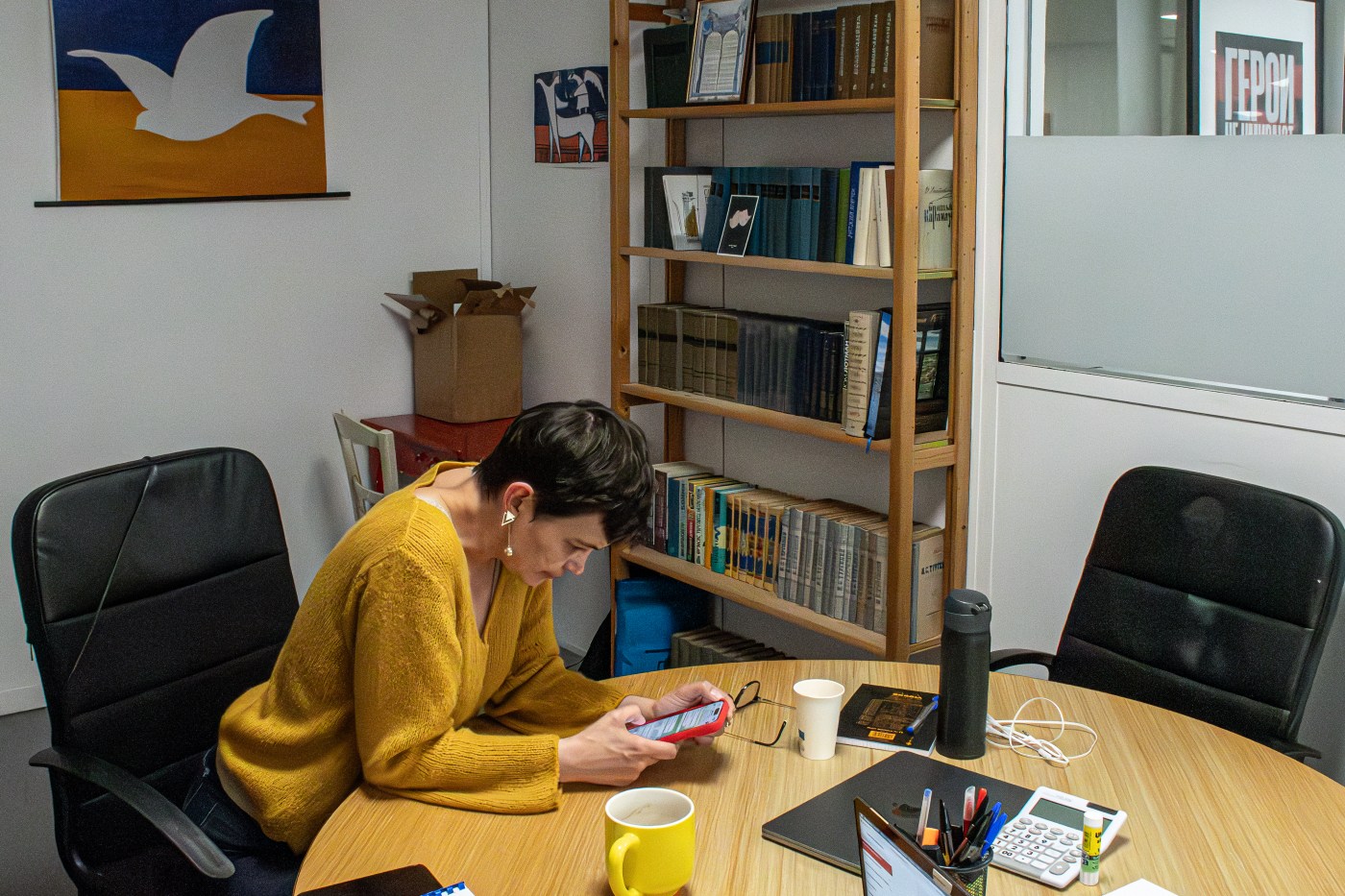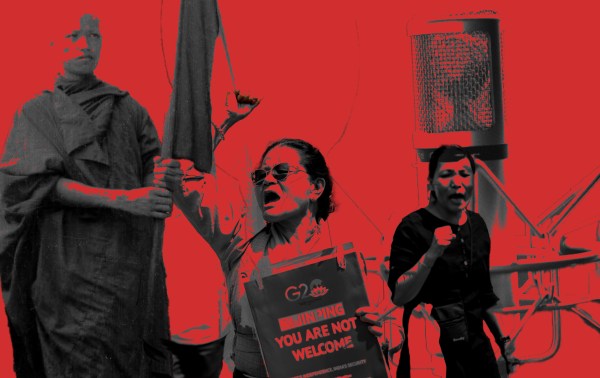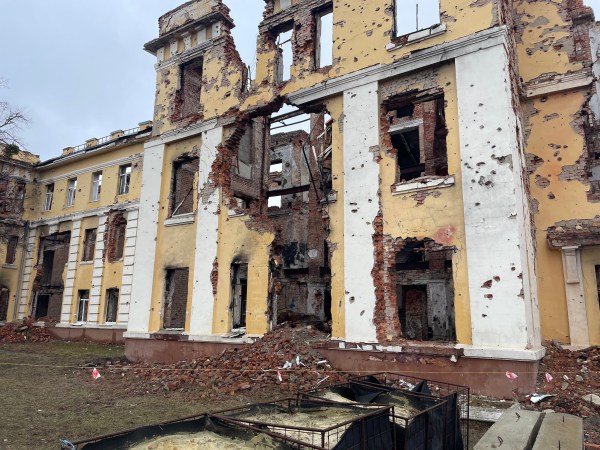PARIS—Maya Korolev is bustling around Reforum Space Paris, one of several professional video studios run by the Free Russia Foundation throughout Europe. As the studio supervisor, she’s preparing to record a program for Doxa, an independent Russian media outlet in exile. Cables snake around tripods, and the spotlights suspended from the ceiling flood the set with bright light.
“Some of the media in exile couldn't survive without our support,” says Korolev (a pseudonym), noting that the Free Russia Foundation provides not only studio space but video equipment and staff to operate it. “Every day, videos shot here accumulate hundreds of thousands of views in Russia, bypassing censorship thanks to VPNs. It's easier to work here without censorship.”
Le Monde estimates that there are at least 1,500 Russian journalists working in exile, many of whom left their home country after Russia invaded Ukraine in 2022. Russia, which Reporters Without Borders (RSF) ranks 162nd out of 180 countries for press freedom, has banned almost all free press and all journalists are subject to censorship. According to RSF, the media “must follow orders issued by the president’s office regarding subjects to be avoided, and must censor themselves closely.” A law enacted on March 4, 2022 spells out a 15-year prison sentence for anyone spreading false information about operations in Ukraine—and false information means any information that does not fit in with the Kremlin's official narrative.
While Russian journalists can work more freely outside of their home country, they face a different set of challenges while in exile. Some have been subject to international arrest warrants or convicted in absentia of being “foreign agents.” A bigger concern at the moment, though, is funding. U.S. Secretary of State Marco Rubio announced on March 10 that his department was canceling 83 percent of U.S. Agency for International Development contracts—and RSF has noted the cancellation affected $268 million that had been allocated by Congress to support independent media.
“Our biggest problem today is the Trump administration,” says Korolev. “It has created a terrible situation and caused us major financial difficulties for the future.” The consequences of the freeze are immediate: “Many independent newsrooms have had to lay off almost 15 percent of their staff,” explains Jeanne Cavelier, Russia manager at RSF.
More bad news came just five days later, on March 15: The Trump administration announced the end of funding for Radio Free Europe/Radio Liberty. “Radio Liberty was an essential source for us,” laments Olga Kokorina, co-founder of the Russie-Liberté association, which supports Russian journalists in Paris. "They were doing an incredible job," she says.
RFE/RL are still broadcasting, albeit in a diminished capacity as legal challenges work their way through the courts. Most recently, an appeals court ruled that the administration had to release $12 million in funding for RFE/RL that had been frozen, but there could be further appeals.
The administration’s efforts to freeze funding are part of a wider retreat by the West in the international battle for information, as the Russians and Chinese go on the offensive. Eight Western nations—the U.S., U.K., France, Germany, Canada, Japan, Australia, and Switzerland—have significant government-backed international media operations. As with RFE/RL and Voice of America, these outlets have a mission of providing balanced and verified information to combat misinformation.
Denis Kataev“You can’t work if you’re paranoid. So we carry on. Discreetly, but we carry on.”
But against a backdrop of growing budget deficits and deliberate funding cuts, most are suffering financially. The BBC World Service, the largest operation besides Voice of America, has cut hundreds of jobs since 2022. France Médias Monde, which operates France 24, Radio France Internationale, and Monte Carlo Doualiya, has reduced its workforce by 20 percent in the last 16 years, with major layoffs in 2009, 2012, and 2021. Budget cuts continue to affect France’s public broadcasting system.
In total, eight main Western international media, based on their latest annual reports, have a collective budget of $2.1 billion. The budgets of the Russian and Chinese media are particularly opaque, as the figures are not public, but the Public Media Alliance, an association for the defense of public media, estimates their combined expenditures to be between $6 billion and $8 billion.
When the BBC shut down its Arabic-language radio service in Lebanon in 2023, its frequencies were swiftly taken over by Russian state media—RT (formerly Russia Today) and Sputnik, the latter banned in Europe since the launch of Russia’s full-scale invasion of Ukraine. Far from hiding its intentions, Moscow seems to relish the provocation, as Arab News noted at the time:
“Back in 1938, when the BBC first launched its radio (service) in Lebanon, it chose the slogan ‘This is London’ as its opening line. Now the news bulletin starts with ‘This is Moscow,’” said Dmitry Tarasov, the chairman of Sputnik Radio in Lebanon.
This information war translates into a relentless struggle for Russian journalists in exile, hampering their ability to reach their audience and making it difficult to overcome censorship and to counter propaganda.
In her cramped office, where the shelves are lined with Chekhov's works and the writings of the late Russian dissident leader Alexei Navalny, Kokorina tries to shed light on the daily struggle of the independent media. “These media did incredible work, and they are the first to be targeted by the Russian regime,” she says, her voice grave.
Added to these financial difficulties is the Kremlin's growing transnational repression. Exile guarantees neither security nor anonymity. “There are open prosecutions against some of us,” says Inna Denisova of the Russian newspaper Republic. She has lived in exile in France since 2022. “We're systematically targeted by international arrest warrants. … I can't go home now, my articles have been passed on to the FSB.”
Jeanne Cavelier of RSF told me that two exiled journalists believe they were poisoned and that others are under surveillance.
Denis Kataev, a presenter for TV Rain, one of the main opposition TV channels in exile, has lived in France since March 2022. He says that he senses the presence of informers on the Kremlin’s payroll in France. “I know that some people around me write reports for Moscow about my activities here,” he says calmly.
While the fear of being hounded never quite disappears, Kataev refuses to be paralyzed. “You can't work if you're paranoid,” he says. “So we carry on. Discreetly, but we carry on.”
Behind his clubmaster glasses, his eyes sparkle with optimism. “Russian society needs a paradigm shift. And to do that, it's essential to provide it with true, reliable and independent information.”






Please note that we at The Dispatch hold ourselves, our work, and our commenters to a higher standard than other places on the internet. We welcome comments that foster genuine debate or discussion—including comments critical of us or our work—but responses that include ad hominem attacks on fellow Dispatch members or are intended to stoke fear and anger may be moderated.
With your membership, you only have the ability to comment on The Morning Dispatch articles. Consider upgrading to join the conversation everywhere.